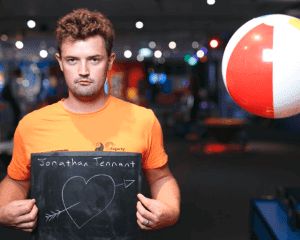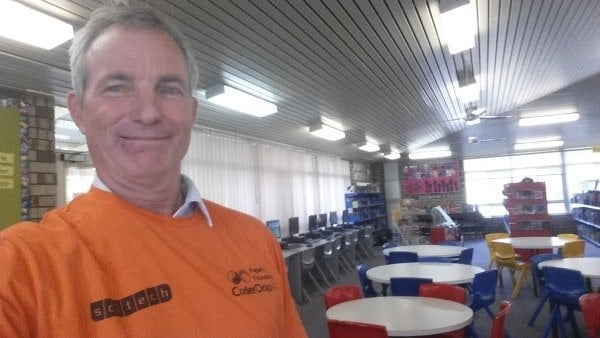Humans of CoderDojo WA – Jonathan Tennant
Jonathan Tennant, Champion
 “Developing software is about more than just the coding, it’s about the activity of breaking down, or otherwise tackling a problem. These skills, once learned, can be applied constantly in day-to-day life. In terms of coding and computers having “totally saved” me, this could be covered a thousand times over by having access to Google and stack-overflow at my fingertips.
“Developing software is about more than just the coding, it’s about the activity of breaking down, or otherwise tackling a problem. These skills, once learned, can be applied constantly in day-to-day life. In terms of coding and computers having “totally saved” me, this could be covered a thousand times over by having access to Google and stack-overflow at my fingertips.
CoderDojo was a natural fit for us. I was teaching my son how to code as a way to improve his ability to reason and to improve his mathematics skills, so joining a Dojo just made sense. It is always a pleasure to see the fascinating creations that our Ninjas come up with, certainly “inspiring” “eye-opening”, “funny”, “rewarding” are all appropriate ways to describe this experience.
My hopes are that by showing today’s generation how we are solving problems, and enhancing their understanding of what is involved in software development, will better enable them to understand the foundations of the technologies they will be working with in the future, because it is certain that the kinds of problems they will be solving will be vastly different to what we’re doing today”.
CoderDojo WA Team Update

As staff of the Fogarty Foundation, we provide support to the CoderDojo WA community to help it grow and thrive. From left: Karen Wellington (CoderDojo WA Program Manager), Rebecca Loftus (EDfutures Coordinator), Janelle Dixon (CoderDojo WA Support).
Meet Jordan, Tim and Jocelyn from the Curtin University Dojo
Jordan is one of the Champions at the Curtin University Dojo
What is the best thing about being a Champion?
The best thing about being a Champion is when a dojo session goes well. It is so satisfying to look back at the day at the end of the session and see that everything went as planned and everyone is happy.
What has been the most unexpected part of the Dojo experience so far?
The most unexpected part of the Dojo experience was seeing how much work goes into running a dojo. Going from mentor to Champion is was eye-opening to see what running a dojo actually involves. From things that should be trivial such as booking rooms, to organising refreshments and running presentations it was difficult but incredibly rewarding experience.
Any advice for new Champions?
Be prepared. Organise everything before a session starts. I recommend having run sheets with all of the activities you plan on doing as well as their times. You will not regret it. Being a champion is hard work but is definitely not an experience you should pass on, championing a well-run dojo is a super rewarding experience.
Tim is a Mentor at Curtin University
What brought you to CoderDojo?
I’m a student at Curtin University studying Software Engineering, being in the labs I constantly saw CoderDojo running on the weekends. The next semester when they were looking for more mentors I decided to sign up and give it a shot.
What has been one of your favourite memories as a Mentor?
I’m always amazed by how much the Ninjas know. My favourite memory would have to be working on a project with a Ninja and using tools that I’m sure many university students wouldn’t have even tried yet! Makes me really wish CoderDojo was around when I was younger, these Ninja’s are going to be amazing later in life.
What advice would you give to anyone thinking about mentoring at a Dojo?
While having some experience with computers/programming is great it’s really not necessary, I’ve mentored at Dojo’s where the Champions and Mentors had no experience with programming. The Dojo still ran great and they even learnt a bit of programming while working with the Ninja’s.
Jocelyn is a parent at the Curtin University Dojo
What has been the best part about CoderDojo for your daughter?
The best part of attending Dojo’s is the great atmosphere, they are always very welcoming and have a relaxed learning environment. My daughter got to meet other students with similar interests, so as well as learning new skills it was also great for her socially.
What do you love about CoderDojo?
I like how it is a volunteer community where we get to see the best of our young people (mentors) happily assisting school students (ninja’s) with learning computer skills and also discussing common interests. I am always in awe of the mentors who give freely of their skills and time.
Ewan, Ninja at UWA Dojo
Ewan is a Ninja at the UWA Dojo. He told us about why he loves coming to CoderDojo and why learning to code is important.
What do you like to do at your Dojo?
I like to make games and animations. I mostly use Scratch but am starting to do a little bit of Python.
What is your favourite thing about CoderDojo?
I like the freedom to make whatever I want. The mentors are able to help me along the way. I have also made lots of friends who like coding too.
Why do you think learning to code is important?
Code is really important because it is in a lot of things in everyday life like most electronic devices and games. Coding is lots of fun and it helps me learn new things and solve problems.
Ewan’s Mum, Kylie, also talked about how CoderDojo has been a great experience for Ewan.
Ewan is 9 has been coding for approximately 2 years. In that time he has completed several projects. I like to look back through them to see how much his skills have developed since starting. Although there is freedom to choose individual projects and for the Ninjas to work at their own pace, they are encouraged to present their projects to the Dojo. I think that this is extremely important as this is very good for developing their presentation skills and confidence. Ewan has made several friends along the way. I have realised that coding is not ageist and Ewan has met many people who have the same interests, but are not the same age group (which is different to school). The Dojos are an accepting environment and I am very grateful to the mentors who donate their time and energy to help the coding students. I hope that one day Ewan will repay the favour.
Robert Cheung, Mentor at UWA Dojo.
We speak to Robert about some of his favourite memories as a Mentor and why mentoring is a great way to “pay it forwards”.
What brought you to CoderDojo?
My employer, IBM, was contacted by the Fogarty Foundation for volunteers for CoderDojo. In particular, the Foundation were hoping for people with IT industry experience. Several of us at work decided to volunteer. For me personally, I enjoy teaching and coaching people. Furthermore, I had the fortune of experiencing computer programming from a young age through various education initiatives at the time, this was a good opportunity to “pay it forwards”.
What has been one of your favourite memories as a mentor?
My favourite memory as a Mentor at CoderDojo is around one particular Ninja. He was very good at going through the online exercise, but had difficulty understanding some of the more advanced ideas. After about 3 semesters, he finally and suddenly “got it”. It was extra gratifying because it was an exercise that I personally devised that provided the final springboard to get him over the line. Given that these concepts are generally taught at year 11/12 level, and this Ninja had only just started high school, it clearly shows that Ninjas are accumulating knowledge and skills through the weekly sessions.
What advice would you give to anyone thinking about mentoring at a Dojo?
The environment is very casual and non-exacting, which might be a very good change of pace for IT professionals. However, don’t mistake that for lack of “achievement”. The amount that the Ninjas learn are non-trivial, and the fact that they happily come back week after week shows they also enjoy it. If you focus on “how can you add value to this session”, you will find that is often all that is needed for things to flow smoothly.
Terry Keesing, Champion at Rostrata Primary School
This month, Rostrata Primary School opened its doors to 95 Ninjas!! Because of the huge demand, they had to split their Dojo into three separate sessions! I caught up with Champion Terry Keesing to ask some questions about his Dojo experience:
What has been the best part of setting up your Dojo?
The best part of setting up a Dojo is seeing the excitement generated by the children while working on their projects. The ninjas are very focused and love the interaction amongst themselves and the free choice they have to work on whatever they want. Is also great to see the girls getting involved in large numbers, and being involved in projects such as robotics. The parent mentors have been helpful and the Dojo has a nice warm community feel about it.
What has been the most unexpected part of the Dojo experience so far?
The most unexpected part was the large number of children wanting to be involved. We didn’t want to turn anyone away, so with 95 Ninjas enrolled, the number of Dojos increased to three. The Dojos run before school from 7.30 to 8.30 three mornings a week.
Any advice for new Champions?
My advice to Champions is: don’t worry about starting a Dojo! I have no coding experience myself, I am just a facilitator of opportunities. I think a little bit of structure is good, but have plenty of opportunities to explore available. For example, I have a web page with hyperlinks to different coding sites. This gives Ninjas an idea of what’s available to them. Mbot robots are fantastic for construction and purposeful coding, and Raspberry Pi and Raspbian are a cheap and great way to encourage coding projects. You don’t have to know about these things though! The Ninjas work together to solve their own problems, and that is the real value of running a Coder Dojo.
